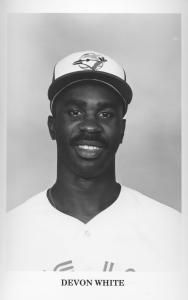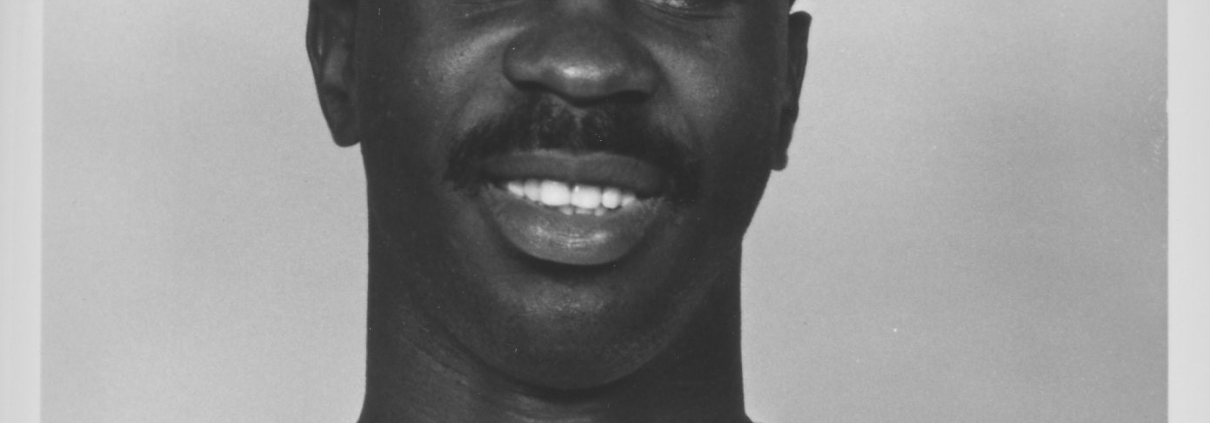October 20, 1992: Blue Jays win first World Series game played in Canada
 The Toronto Blue Jays scored three runs in their last two innings to beat the Atlanta Braves 5-4 in Game Two of the 1992 World Series and tie the Series at one victory each after the first two games in Atlanta. This victory was another part of the team’s 1992 season story: teamwork at the right times resulting in wins.
The Toronto Blue Jays scored three runs in their last two innings to beat the Atlanta Braves 5-4 in Game Two of the 1992 World Series and tie the Series at one victory each after the first two games in Atlanta. This victory was another part of the team’s 1992 season story: teamwork at the right times resulting in wins.
The Blue Jays had won their fans’ hearts as well as those of the whole Canadian nation as they won the American League Championship Series in impressive fashion. The club had failed to win a pennant in three previous postseason series (1985, 1989 and 1991) with a postseason record since 1985 of five wins and 12 losses. Reaching the World Series – the first in their 16-year franchise history – offered fans a level of competition on the international stage comparable to the 1972 Canada-Russia hockey series.
Which Toronto club would show up at SkyDome? Could Atlanta recover from its Game Two loss? The Blue Jays’ pitching and defense had earned their tie despite starting position players having a combined batting average of .151 in the first two games. Atlanta played well at times but its pitching and defense faltered at other times.
Game Three was the first World Series game to be played outside the United States. An enthusiastic sellout crowd of 51,813 and a CBS television audience watched this historic game.
In the pregame ceremonies, some controversies from the previous game were resolved without incident. The US Marine Corps Color Guard had inadvertently displayed the Canadian flag upside down before Game Two. And Canadian singer Tom Cochrane sang lyrics from an earlier version of the Canadian national anthem than the one which had been officially designated as such in 1980. The Canadian flag was properly displayed by the Color Guard and singer Anne Murray sang the anthem’s correct (1980) version prior to this game.1
Game Three began as a pitchers’ duel between Blue Jays starter Juan Guzmán and Braves starter Steve Avery. Neither team scored in the first three innings.2
In the fourth inning, Atlanta threatened to score the game’s first run. Deion Sanders led off with an infield single and moved to second base on Terry Pendleton’s single to right-center field. Then fans saw one of the greatest catches in World Series history on the next play and a near triple play.3
David Justice hit a high fly ball off Guzmán toward deep center field, where Blue Jays center fielder Devon White made a spectacular backhanded catch as he crashed into the wall just to the left of the 400-foot sign. This play robbed Justice of an extra-base hit and was reminiscent of Willie Mays’ catch of Vic Wertz’s fly ball in the 1954 World Series.4
As the play developed, Sanders stood on the basepath between second and third base watching the ball’s flight while Pendleton, who had started to run when the ball was hit, passed Sanders between second and third base. Both runners began to retreat back to their original bases when the ball was caught. Meanwhile, White threw the ball to second baseman Roberto Alomar, who was in shallow center field. Then Alomar threw to first baseman John Olerud in an attempt to double up Pendleton. But Pendleton was already automatically out for passing Sanders. Olerud saw that Sanders had started running toward third and threw the ball to third baseman Kelly Gruber to try to put Sanders out. Gruber began to chase the runner back toward second base and tagged Sanders on his right heel before Sanders could slide back into the base. However, second-base umpire Bob Davidson called Sanders safe and it appeared that he did not see the tag. His call denied the Blue Jays a rare World Series triple play.5
The third baseman tried to appeal his case to the umpire. “Are you crazy?” said Gruber. Davidson’s response stunned Gruber, “Kelly, you might have, but I saw daylight.”6 Television replays and media photographs indicated that Gruber had tagged out Sanders.
After the game, Davidson admitted in an interview that he had made the wrong call. “When I first called the play, I thought I was 100 percent right,” Davidson, a National League umpire, said. “It was right there. It was right in front of me. Then I saw the replays and the picture and I thought I probably missed the play. But that’s baseball, and I have to turn the page and go on today. No one feels worse about it than I do. I don’t like to miss plays. Gruber told me right away that he had gotten his heel. He was professional about it, though, and it was no big deal. I thought I was correct at first. But then I saw the pictures, and I had to admit that I probably missed it.”7
It was ruled a double play. With Sanders standing on second base with two outs, Guzmán struck out Lonnie Smith to end the inning and the Braves’ scoring threat.
With one out in the Blue Jays’ fourth, Joe Carter hit a solo home run over the left-field fence to give Toronto a 1-0 lead – the first World Series home run hit outside the United States. Avery retired the next two Toronto batters to end the inning.
Atlanta rallied to tie the score at 1-1 with some good hitting off Guzmán in the sixth inning. Sanders hit a one-out double to right field and moved to third on Pendleton’s single to deep shortstop. Justice’s single to right field scored Sanders and moved Pendleton to second base. But Guzmán then retired the side on a fly out and a groundout.
Atlanta took a 2-1 lead in the eighth inning. Otis Nixon, leading off, reached first base on Gruber’s error and stole second. Sanders popped out, but Pendleton’s groundout sent Nixon to third. Justice was intentionally walked. Nixon scored on Lonnie Smith’s single to left field, but Justice was thrown out at third base, retiring the Braves.
The Blue Jays quickly forged another tie when Gruber led off the bottom of the eighth inning by hitting an Avery 3-and-2 pitch over the left-field fence to square the game at 2-2. The SkyDome crowd roared their approval as the ball disappeared into the crowd. The next three Jays batters were quickly retired by Avery to end the inning.
In the ninth, both managers used late-inning strategies and the fans saw the first World Series managerial ejection since 1985.
When the Braves came to bat, Toronto manager Cito Gaston replaced Guzmán with Duane Ward, who allowed Sid Bream’s leadoff single to right-center field. Brian Hunter, an excellent baserunner, replaced Bream at first. Hunter attempted to steal second on Ward’s 2-and-2 pitch to Jeff Blauser. As Blauser appeared to check his swing, Blue Jays catcher Pat Borders threw to shortstop Manuel Lee, who tagged out Hunter.
Borders argued to home-plate umpire Joe West that Blauser had swung on the pitch for a third strike. West asked first-base umpire Dan Morrison for a decision on the pitch; Morrison said that Blauser had swung for a third strike, and it was a double play.
Braves manager Bobby Cox, upset with the ruling, angrily tossed a batting helmet from the dugout onto the field, and was ejected by West with the SkyDome crowd’s approval.8 Ward struck out Damon Berryhill to end the Braves’ inning.
Braves third-base coach Jimy Williams, who had taken over managerial duties, allowed Avery to start the ninth inning, but when he gave up a single to Alomar, Williams replaced him with Mark Wohlers. Alomar stole second base on Wohlers’ 2-and-0 pitch to Carter, prompting Atlanta to walk Carter intentionally.
Dave Winfield laid down a surprise sacrifice bunt to advance both runners. Williams replaced Wohlers, calling on Mike Stanton to face Olerud.
Once Stanton was announced, Gaston sent up pinch-hitter Ed Sprague, whose home run had won Game Two. Stanton walked Sprague intentionally, loading the bases with one out.
Williams summoned the inning’s third relief pitcher, Jeff Reardon, to face Candy Maldonado. On a two-strike count, Maldonado drove the ball over Nixon’s head in center field and Alomar scored the game-winning run. He did the “Tomahawk Chop” as he ran home from third base.
The Jays had won their second consecutive game over the Braves with a 3-2 walk-off win in the bottom of the ninth inning. SkyDome fans celebrated in the stands while the Blue Jays celebrated on the field.
In a postgame interview, Gruber said, “We’ve been known as the ‘Comeback Jays’ and that’s an attitude that I am proud of.”9
The Braves’ loss meant that in each of their last four World Series defeats, the decisive runs came in the final inning, and that their last three World Series road losses were walk-offs.
Toronto took a two-games-to-one Series lead with two more games to be played at SkyDome. The Blue Jays’ 3-2 walk-off win was the first Series victory for a major-league ball club outside the United States.
Sources
In addition to the sources cited in the Notes, the author consulted Baseball-Reference.com, Retrosheet.org, SABR.org, and other sources, including the following:
https://www.baseball-reference.com/boxes/TOR/TOR199210200.shtml
https://www.retrosheet.org/boxesetc/1992/B10200TOR1992.htm
Notes
1 The original Canadian anthem was written in 1880 which was 13 years after the Canadian Constitution was written. For 100 years, there were various anthem versions used by the Canadian people. In 1980, the Canadian Parliament passed the National Anthem Act which designated “O Canada” as Canada’s national anthem, with the lyrics as sung by Anne Murray.
2 Atlanta’s Avery and Toronto’s Guzmán each gave up one hit and struck out three batters over the first three innings.
3 The near triple play would have been the second triple play executed in World Series history (1903-2021). In Game Five of the 1920 World Series, Cleveland Indians second baseman Bill Wambsganss made an unassisted triple play against the Brooklyn Robins. SABR Triple Play Database (https://sabr.org/tripleplays). Also, see YouTube video clip for Devon White’s catch. (https://www.youtube.com/watch?v=GYA61SGGjbw).
4 New York Giants center fielder Willie Mays, with his back facing home plate, made a spectacular overhead catch of a fly ball by the Cleveland Indians’ Vic Wertz in deep center field at the New York Giants’ Polo Grounds in Game One of the 1954 World Series. Associated Press, “White’s Catch Ranks Among All-Time Best,” Ocala (Florida) Star Banner, October 22, 1992: 2.
5 Mike Lopresti, “Oh, Candy: O Canada,” Rochester (New York) Democrat & Chronicle, October 21, 1992: 1D.
6 Callum Hughson, “Profiling Former Blue Jays Third Baseman Kelly Gruber,” January 17, 2020 interview, retrieved March 25, 2022. https://mopupduty.com/toronto-blue-jays-third-baseman-kelly-gruber-011720/ Gruber was stunned by the umpire’s response to his appeal and was expecting an argument to ensue.
7 Mark Maske, “Umpire Admits His Mistake,” Washington Post, October 22, 1992, retrieved March 25, 2022. https://www.washingtonpost.com/archive/sports/1992/10/22/umpire-admits-his-error/350344e6-607a-48d0-b884-eb00d9ccb411/.
8 St. Louis Cardinals manager Whitey Herzog was ejected for arguing an umpire’s balls/strikes call in Game Seven of the 1985 World Series against the Kansas City Royals.
9 Tom Slater, “Right Side Up!,” Toronto Star, October 21, 1992: D1.
Additional Stats
Toronto Blue Jays 3
Atlanta Braves 2
Game 3, WS
SkyDome
Toronto, ON
Box Score + PBP:
Corrections? Additions?
If you can help us improve this game story, contact us.


